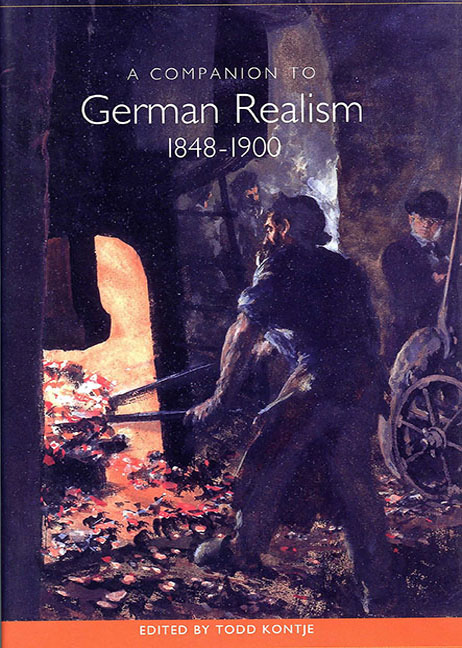Book contents
- Frontmatter
- Contents
- Preface
- Introduction: Reawakening German Realism
- Adalbert Stifter's Brigitta, or the Lesson of Realism
- Mühlbach, Ranke, and the Truth of Historical Fiction
- “In the Heart of the Heart of the Country”: Regional Histories as National History in Gustav Freytag's Die Ahnen (1872–80)
- A Woman's Post: Gender and Nation in Historical Fiction by Louise von François
- Friedrich Spielhagen: The Demon of Theory and the Decline of Reputation
- Wilhelm Raabe and the German Colonial Experience
- From National Task to Individual Pursuit: The Poetics of Work in Freytag, Stifter, and Raabe
- Das Republikanische, das Demokratische, das Pantheistische: Jewish Identity in Berthold Auerbach's Novels
- E. Marlitt: Narratives of Virtuous Desire
- The Appeal of Karl May in the Wilhelmine Empire: Emigration, Modernization, and the Need for Heroes
- Making Way for the Third Sex: Liberal and Antiliberal Impulses in Mann's Portrayal of Male-Male Desire in His Early Short Fiction
- Effi Briest and the End of Realism
- Works Cited
- Notes on the Contributors
- Index
“In the Heart of the Heart of the Country”: Regional Histories as National History in Gustav Freytag's Die Ahnen (1872–80)
Published online by Cambridge University Press: 27 April 2017
- Frontmatter
- Contents
- Preface
- Introduction: Reawakening German Realism
- Adalbert Stifter's Brigitta, or the Lesson of Realism
- Mühlbach, Ranke, and the Truth of Historical Fiction
- “In the Heart of the Heart of the Country”: Regional Histories as National History in Gustav Freytag's Die Ahnen (1872–80)
- A Woman's Post: Gender and Nation in Historical Fiction by Louise von François
- Friedrich Spielhagen: The Demon of Theory and the Decline of Reputation
- Wilhelm Raabe and the German Colonial Experience
- From National Task to Individual Pursuit: The Poetics of Work in Freytag, Stifter, and Raabe
- Das Republikanische, das Demokratische, das Pantheistische: Jewish Identity in Berthold Auerbach's Novels
- E. Marlitt: Narratives of Virtuous Desire
- The Appeal of Karl May in the Wilhelmine Empire: Emigration, Modernization, and the Need for Heroes
- Making Way for the Third Sex: Liberal and Antiliberal Impulses in Mann's Portrayal of Male-Male Desire in His Early Short Fiction
- Effi Briest and the End of Realism
- Works Cited
- Notes on the Contributors
- Index
Summary
In the final decades of the nineteenth century Freytag's Die Ahnen (The Ancestors, 1872–80) graced many a middle-class German “Geschenktisch” at confirmation and at Christmas time. It was recommended as reading for educators as well as for bourgeois “young girls,” and it sold quite well. By 1907 a thirty-fifth edition of the first volume had appeared from the original publisher, Hirzel, and the book, including an illustrated version, was listed among the titles available from several additional publishing houses. For some contemporary critics, Die Ahnen exemplified a national literature appropriate to solidifying the new national aggregate that had come into being under Prussian leadership. Indeed, in 1888 one School Inspector Grüllich could scarcely contain his enthusiasm for this Song of Songs “das uns Mannhaftigkeit und Hochherzigkeit, Treue und Liebe ins Herz singt.” The Saxon bureaucrat went so far as to assert that Die Ahnen took up subjects that only Germans could understand. Why is it, he asked in a voice bursting with nationalist pathos as he reviewed the German virtues he believed incorporated in Die Ahnen, that it is precisely this ancestral language that other nations have not understood?
Such ethnocentric reactions on the part of nineteenth-century contemporaries may tempt us to read this cycle of historical novels as but one more straightforward example of the invention of a common German past, an idealized and monumentalized one that was to promote in German-speaking readers — from the center of power and from the top down — universal identification with the newly formed empire. Certainly one of Freytag's central themes in his pre-unification popular history, Bilder aus der deutschen Vergangenheit (1859–67), supports such a reading of Die Ahnen. In Bilder Freytag had stressed that writing in and of itself — and literature in particular — had served and could serve to bind all Germans together in, to use Benedict Anderson's oft-cited coinage, an “imagined community.” And in 1854 Freytag himself had insisted in his well-known review of Willibald Alexis's Isegrimm on an aesthetic of novel writing that corresponded to such an imagined harmonious national whole; that is, he had demanded of the historical novel a unified and conclusive plot (16: 189).
- Type
- Chapter
- Information
- A Companion to German Realism 1848-1900 , pp. 85 - 108Publisher: Boydell & BrewerPrint publication year: 2002



